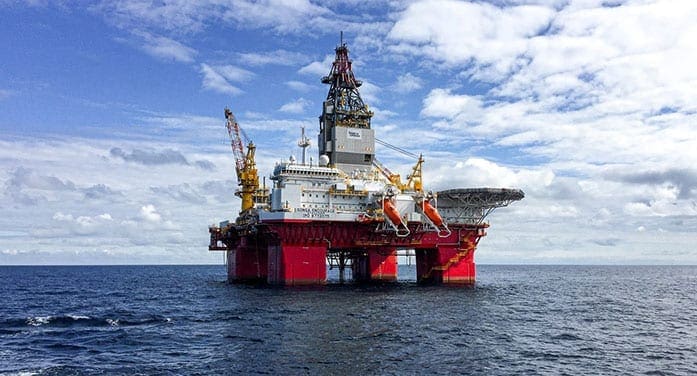 Europe needs new suppliers to get off Russian oil and maintain energy security in the long term.
Europe needs new suppliers to get off Russian oil and maintain energy security in the long term.
Newfoundland and Labrador’s offshore oil industry is already a steady supplier and can grow significantly if major projects get the go-ahead.
“We have the potential certainly to be producing more,” says Paul Barnes, Atlantic Canada and Arctic director with the Canadian Association of Petroleum Producers.
“We hope to be the supplier of Europe, like we have been for a number of years, in the long term.”
Europe’s countries consumed 11.9 million barrels of oil per day in 2020, according to the International Energy Agency (IEA). Over one-quarter of the supply came from Russia.
Demand is expected to decrease in the coming decades, but Europe is still expected to consume 10.4 million barrels per day in 2030 and 6.4 million barrels per day in 2050, according to the IEA’s latest outlook.
While the primary market for Newfoundland and Labrador’s offshore oil is the United States, projects sent an average of about 83,000 barrels per day to Europe between 2015 and 2021, according to Statistics Canada.
Those oil exports had a total value of over $11.4 billion.
| Keep an Eye on Newfoundland |
Europe’s top five purchasers of Canadian offshore oil over the last half-decade were the United Kingdom ($4.1 billion), Italy ($2.3 billion), Netherlands ($2 billion), Spain ($1.8 billion), and Ireland ($457,000).
According to the Canada Energy Regulator, Newfoundland and Labrador’s offshore oil production hit its highest level in 2007 at about 425,000 barrels per day. The Hebron oil project that came online in late 2017 has helped offset declining production from existing projects.
As of December 2021, the province’s total offshore oil production was about 230,000 barrels per day.
That production has lower greenhouse gas emissions than the global average. Oil from Newfoundland and Labrador has average emissions of 13.8 kg per barrel, compared to the offshore international average of 16.1 kilograms per barrel, the province says.
The first step for production growth will come later this year as the Terra Nova floating production, storage and offloading (FPSO) vessel, shut in since the end of 2019, comes back online.
In 2021, operator Suncor Energy and its partners announced an extension project to refurbish the vessel and give it a decade more life. Production is expected to reach 29,000 barrels per day in 2023.
Another 75,000 barrels per day could come online in the near term if Cenovus Energy and its partners resume construction of the West White Rose project.
West White Rose is a production platform that would connect to the existing Sea Rose FPSO. Construction was suspended in 2020 at about 60 per cent complete amid the oil price crash from pandemic lockdowns.
A decision on whether to restart is expected by mid-2022.
Next could be Bay du Nord, which would significantly expand Newfoundland and Labrador’s offshore oil production. The project was recently approved to proceed by the federal government after months of regulatory delay.
Bay du Nord oil project needs swift approval by Miguel Ouellette
Economic benefits crucial to the Newfoundland and Labrador economy
Newfoundland’s Bay du Nord a bad investment by Conor Curtis
Both economically and environmentally
Owned by Norway-based Equinor, the proposed 200,000-barrel-per-day project is expected to have emissions of less than eight kg per barrel, about half of the current international average.
The project now awaits a final investment decision by Equinor. If built, it would nearly double current offshore oil production in Newfoundland and Labrador.
Deborah Jaremko is director of content for the Canadian Energy Centre, an Alberta government corporation funded in part by taxes paid by industry on carbon emissions.
Deborah is a Troy Media Thought Leader. For interview requests, click here.
The opinions expressed by our columnists and contributors are theirs alone and do not inherently or expressly reflect the views of our publication.
© Troy Media
Troy Media is an editorial content provider to media outlets and its own hosted community news outlets across Canada.


Dear Deborah,
I grew up in Montana and ultimately lived in Calgary. Couple of things make money in those areas of the world; oil and cattle. Newfoundland has all the assets to make it happen as a substitute for Russian oil. Then again, there is the lack of a “fast track” on permitting and getting the “green light” to get projects off the ground and completely funded. I am not faulting the government but it seems like energy issues move slowly in Atlantic Canada and in the end it hurts projects and ultimately the people who live there. We have a perfect storm here with Russia. If Canada, specifically Atlantic Canada, does not strike the opportunity may not be seen for decades to come.
Just my opinion as someone who understands and grew up in the industry. Exceptional article as you have a solid foundation on what Atlantic Canada is facing. You made your point very well and I hope important people will take notice.
Respectfully,
Christina Saint Marché